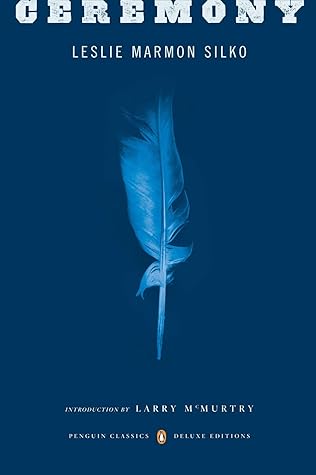More on this book
Community
Kindle Notes & Highlights
the novel was my refuge, my magic vehicle back to the Southwest land of sandstone mesas, blue sky, and sun. As I described the sandstone spring, the spiders, water bugs, swallows, and rattlesnakes, I remade the place in words; I was no longer on a dark rainy island thousands of miles away. I was home, from time immemorial, as the old ones liked to say to us children long ago.
Silko's introduction is not to be missed. It is a great testament to her growth as a writer, her important early writing friendships, and the process and experience of living in Alaska while writing about the American Southwest.
wasn’t just homesick for the sandstone cliffs and the sun; I missed the people and the storytelling, so I incorporated into the novel the old-time story about Hummingbird and Green Fly, who help the people purify their town to bring back the Corn Mother. The title of the novel, Ceremony, refers to the healing ceremonies based on the ancient stories of the Diné and Pueblo people. The two years I lived and taught for Diné College were important to my understanding of the healing ceremony’s relationship to storytelling. I was conscious of constructing the novel out of many different kinds of
...more
I wrote about Harley’s desperate thirst for alcohol, it didn’t seem so funny after all, and I realized I wanted to better understand what happened to the war veterans, many of whom were survivors of the Battan Death March,
As I wrote what I thought would be a comical short story about Harley and his drunken exploits, suddenly a friend of Harley’s—a character I never planned to have—Tayo, entered the story.
Eighty miles from the Bering Sea and with temperatures of fifty below zero, I still found Bethel preferable to Ketchikan because at least the frozen tundra had blue sky and miles of visibility in all directions.
I remember the day I had lunch with my friend Rose Prince in Bethel and told her and her friend about my idea to have all things European invented by a tribal witch.
Jungle rain had no beginning or end; it grew like foliage from the sky, branching and arching to the earth, sometimes in solid thickets entangling the islands, and, other times, in tendrils of blue mist curling out of coastal clouds.
It was there that Tayo began to understand what Josiah had said. Nothing was all good or all bad either; it all depended.
For a long time he had been white smoke. He did not realize that until he left the hospital, because white smoke had no consciousness of itself. It faded into the white world of their bed sheets and walls; it was sucked away by the words of doctors who tried to talk to the invisible scattered smoke. He had seen outlines of gray steel tables, outlines of the food they pushed into his mouth, which was only an outline too, like all the outlines he saw. They saw his outline but they did not realize it was hollow inside.
“I am sending you home, Tayo; tomorrow you’ll go on the train.” “He can’t go. He cries all the time. Sometimes he vomits when he cries.” “Why does he cry, Tayo?” “He cries because they are dead and everything is dying.”


